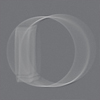 Paul Gough's latest album borrows its title from a line in Russell Hoban's Riddley Walker, a dystopian novel where humanity regresses to a primitive, semi-literate state in the aftermath of a nuclear holocaust.  That reference seemed perfectly apt to Gough, as The Oansome Orbit drew much inspiration from meditations on loss, isolation, and disconnection.  Fertile themes for great art, certainly, but it was already pretty much a foregone conclusion that a new Pimmon album would be a noteworthy event: Gough has been making wonderfully complex and distinctive abstract soundscapes for more than a decade now and he only seems to get better with age.
Paul Gough's latest album borrows its title from a line in Russell Hoban's Riddley Walker, a dystopian novel where humanity regresses to a primitive, semi-literate state in the aftermath of a nuclear holocaust.  That reference seemed perfectly apt to Gough, as The Oansome Orbit drew much inspiration from meditations on loss, isolation, and disconnection.  Fertile themes for great art, certainly, but it was already pretty much a foregone conclusion that a new Pimmon album would be a noteworthy event: Gough has been making wonderfully complex and distinctive abstract soundscapes for more than a decade now and he only seems to get better with age.
As much as I enjoyed Pimmon's last album (2009's Smudge Another Yesterday), I was a bit frustrated by how fleeting and far between the sublimely melodic parts were.  Fortunately, that minor exasperation was largely balanced-out by the fact that Gough is one of the exacting and texturally creative producers currently working in abstract electronic music.  After hearing The Oansome Orbit, it almost seems like Paul heard my thoughts and purposely set out to spite me.  Aside from the billowing and shimmering drone of the opening "Passing, Never To Be Held," Gough makes very few concessions to conventional melodicism.  Instead, Pimmon now sounds more distinctly Pimmon-esque.
As it turns out, I was laboring under the misconception that Gough still had a bit of room to improve as a composer, whereas he was probably thinking that he could stand to jettison most similarities to other drone artists and go deeper and farther.  He was right and that's exactly what he did.  As a result, The Oansome Orbit sacrifices quite a bit in the way of accessibility and immediate gratification, but it is ultimately better art for it.  Paul hasn't made a good drone album–he's created a prickly, multilayered aural narrative.  It requires a bit of openness and focus to fully appreciate, but it is worth it (especially on headphones, where every detail of Gough's vibrant soundworld is audible).
The album is best appreciated as an immersive and cumulatively powerful whole, but there are naturally some individual moments that stand out.  In fact, the whole album is littered with unexpectedly transfixing passages, as Paul seems to have a deep aversion to both stasis and predictability (especially for someone working roughly within the drone genre).  The most striking stand-alone piece, however, is the woozy and warped "Arcangel In Reverse," which sounds like an angelic and blissed-out drone piece being slowly eaten by a tape player.  The lengthy and cryptically titled "Düülbludgers" is also attention-grabbing, but for very different reasons: it gradually escalates into an interlude of grinding cacophony before ending with an equally dissonant coda of clashing tones.
Such harshness is a definite anomaly though, as the pervasive mood is closer to free-floating melancholy (or something a bit more complex).  Regardless of its disposition, The Oansome Orbit is ultimately a constantly shifting and disorienting vista of sharply defined crackles, shudders, throbs, and corroded melodies hidden by an undulating mist of hiss and decay.  Which, I suppose, is exactly what Gough set out to achieve artistically.
Samples:
 
Read More

